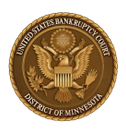You are here
Local Rules
Part I. Commencement of Case: Proceedings Relating to Petition and Order for Relief
- Rule 1005-1. [ABROGATED]
- Rule 1006-1. Filing Fee
- Rule 1007-1. Lists, Schedules, and Statements
- Rule 1007-2. Creditor Matrix and Supplemental Lists
- Rule 1007-3. Statement of Business Income in Chapter 13 Cases
- Rule 1007-3-1. Notice of Responsibilities of Chapter 7 and 13 Debtors and Their Attorneys
- Rule 1007-4. [ABROGATED]
- Rule 1008-1. [ABROGATED]
- Rule 1009-1. Amendments of Voluntary Petitions, Lists, Schedules, and Statements
- Rule 1010-1. Service in Involuntary Cases
- Rule 1014-1. Transfer of Cases
- Rule 1015-1. Joint Case of Debtor Spouses
- Rule 1017-2. [ABROGATED]
- Rule 1019-1. Filing Requirements for Conversions
- Rule 1070-1. Reference
- Rule 1073-1. Assignment of Cases
Part II. Officers and Administration; Notices; Meetings; Examinations; Elections’ Attorneys and Accountants
- Rule 2002-1. Notices
- Rule 2002-4. [ABROGATED]
- Rule 2002-5. [ABROGATED]
- Rule 2003-1. Meeting of Creditors
- Rule 2014-1. Employing Professionals
- Rule 2015-1. [ABROGATED]
- Rule 2015.1-1. Patient-Care Ombudsman’s Report
- Rule 2016-1. Compensation of Professional Persons
- Rule 2016-2. Disclosure of Compensation in Adversary Proceeding
- Rule 2019-1. Disclosures by Groups, Committee, and Other Entities
- Rule 2020-1. [ABROGATED]
Part III. Claims and Distribution to Creditors and Equity Interest Holders; Plans
- Rule 3002-2. [ABROGATED]
- Rule 3002-3. [ABROGATED]
- Rule 3003-1. Time for Non-Governmental Entities to File Proofs of Claim in Chapter 11 Cases
- Rule 3007-1. [ABROGATED]
- Rule 3009-1. [ABROGATED]
- Rule 3010-1. Small Dividends and Payments in Chapter 13 Cases
- Rule 3011-1. Unclaimed Funds
- Rule 3012-1. [ABROGATED]
- Rule 3015-1. Chapter 12 or 13 – Filing Plans, Modifying Plans, and Objecting to Confirmation
- Rule 3015-2. [ABROGATED]
- Rule 3016-1. [ABROGATED]
- Rule 3017-1. Chapter 11 – Objections to Approval of Disclosure Statements
- Rule 3017.1-1. Objections to Approval of Disclosure Statements in Small Business or Subchapter V Cases
- Rule 3019-1. [ABROGATED]
- Rule 3020-1. Chapter 11 – Confirmation of a Plan
- Rule 3021-1. Chapter 13 – Adequate Protection Payments Paid Through Trustee
Part IV. The Debtor: Duties and Benefits
- Rule 4001-1. Motion for Relief from the Automatic Stay
- Rule 4001-2. Motion for Authorization to Use Cash Collateral
- Rule 4002-1. [ABROGATED]
- Rule 4003-1. Notice of an Amendment to a Claimed Exemption
- Rule 4004-1. Debtor’s Certifications Regarding Domestic Support Obligations and 11 U.S.C. § 522(q)
- Rule 4004-3. [ABROGATED]
- Rule 4008-1. Reaffirmation Agreement
Part V. Bankruptcy Courts and Clerks
- Rule 5005-1. [ABROGATED]
- Rule 5009-1. [ABROGATED]
- Rule 5010-1. [ABROGATED]
- Rule 5011-1. Withdrawal of Reference
- Rule 5011-3. [ABROGATED]
- Rule 5071-1. Request for a Continuance
- Rule 5095-1. [ABROGATED]
Part VI. Collection and Liquidation of the Estate
- Rule 6004-1. [ABROGATED]
- Rule 6007-1. Abandoning or Disposing of Property Upon Chapter 7 Case Closing
- Rule 6007-2. Abandoning or Disposing of Property Containing Hazardous Substances
- Rule 6072-1. [ABROGATED]
Part VII. Adversary Proceedings
- Rule 7004-1. Issuance of Summons
- Rule 7005-2. [ABROGATED]
- Rule 7007-1. Motions and Responses
- Rule 7018-1. [ABROGATED]
- Rule 7037-1. Discovery Motions
- Rule 7041-1. [ABROGATED]
- Rule 7054-1. [ABROGATED]
- Rule 7055-1. Default Judgment
- Rule 7056-1. Summary Judgment Motions
- Rule 7067-1. Depositing in and Withdrawing Money from the Court Registry
- Rule 7069-1. [ABROGATED]
Part VIII. Appeals to District Court or Bankruptcy Appellate Panel
Part IX. General Provisions
- Rule 9001-1. Definitions
- Rule 9004-1. Required Form of Documents
- Rule 9006-1. Time Periods
- Rule 9010-1. Attorneys
- Rule 9010-2. Appearances by Non-Individuals
- Rule 9011-1. Signatures
- Rule 9013-1. Motions – Form
- Rule 9013-2. Motions – Service and Notice
- Rule 9013-3. Applications
- Rule 9013-4. Corporate Ownership Statements
- Rule 9013-5. [ABROGATED]
- Rule 9017-1. No Evidence at Initial Motion Hearing
- Rule 9019-1. Compromise or Settlement
- Rule 9019-2. Mediation
- Rule 9021-1. Entry of Judgments in Adversary Proceedings
- Rule 9022-1. [ABROGATED]
- Rule 9029-1. Rules – General
- Rule 9029-2. Rules - Adoption and Amendment
- Rule 9033-1. Findings and Conclusions in Non-Core Proceedings
- Rule 9036-1. Notice and Service on Non-Filing Users and Trustees
- Rule 9070-1. Exhibits
